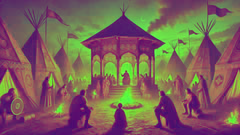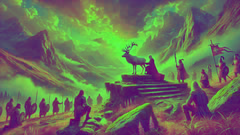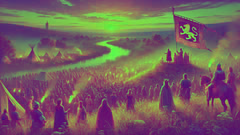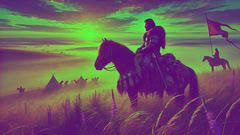Introduction
Hungary’s vast plains once rippled with tall, golden grasses, and its forests whispered with secrets carried by the wind. Beneath the open sky, the Magyar tribes roamed—herders, warriors, and dreamers bound to the land by blood and song. Here, in the heart of the Carpathian Basin, the world was never truly divided; spirits lived beside mortals, and magic threaded through every shadow and beam of sunlight. The Taltos, shamanic figures marked from birth, walked among these people. Some called them the chosen, others feared them as witches, but none could deny the Taltos’ place in the unbroken chain of Hungary’s destiny. Their powers—visions, healing, the gift to cross into the spirit world—set them apart, yet their purpose was never selfish. They were guardians and mediators, called to mend what was torn, to seek wisdom where others saw only darkness, to defend the people from what lurked in the unseen. On the eve of a blood-red moon, as a chill wind crept over the fields and the wolves howled from the hills, a boy named Miklós was born with teeth in his mouth and a caul over his face—signs that marked him as Taltos. His fate would be entwined with legends older than memory, his path lit by omens and threatened by forces that slithered from beyond the mortal veil. As Hungary’s villages huddled together against famine and war, and rumors of shadowy spirits spread with each cold dawn, it was whispered that the Taltos alone could stand at the crossroads of worlds. But what price would be asked of those who dared to bridge the living and the dead? This is the story of Miklós—the boy who became a shaman, the Taltos who would either save or doom his people, and the ancient wisdom that endures like the roots of the oldest oak.
I. The Child with the Shaman’s Mark
Miklós’s birth was an event whispered about for years to come. In the Magyar camp near the banks of the Tisza, the midwife gasped as she unwrapped the baby’s face—a translucent caul clinging to his skin, and two tiny white teeth gleaming from his gums. The old women crossed themselves, muttering old prayers, while Miklós’s mother, Ilona, wept tears of mingled joy and fear. Such a child, she knew, was not ordinary. The Taltos were chosen before they were born, it was said. Some believed their souls had wandered in other worlds before returning to this one. Others insisted they were gifts from the ancestors or omens sent by the ancient gods of the land. His father, Sándor, stood tall but uneasy at the tent’s entrance. He was a horseman, a warrior, and the whispers of shamanic fate unsettled him. But Ilona gathered her son close and sang lullabies older than the Magyars’ journey westward, vowing to protect him from fear and suspicion. Miklós grew quickly, strong and bright-eyed. He spoke before most children could babble and walked early, his feet sure on the springy grass. Yet there was always a sense of otherness about him. The dogs never barked at his approach; horses nuzzled his hands with uncanny trust. At night, he would wake screaming, caught in dreams where ghostly armies marched and rivers ran backward beneath a pale moon. Word spread among the tribe. Some brought sick children for Miklós to touch, and when fevers broke, their gratitude was fierce. Others shunned him, warning their children not to play near the yurt where strange lights sometimes flickered at midnight. One evening, when Miklós was seven, a wild stallion broke free from its tether and charged through the camp, scattering adults and children alike. Miklós alone stood in its path. He raised his hand, and the beast halted, trembling. For a moment, everyone saw it: the way his eyes glowed with a light that didn’t seem wholly of this world. That night, Miklós’s destiny was sealed. The tribe’s eldest woman, Grandmother Borbála, visited Ilona and Sándor. She wore a cloak of wolf pelts and carried a staff crowned with antlers. Her face was as wrinkled as river stones, her gaze sharp as a hawk’s. 'The spirits have claimed him,' she said. 'He must be trained. The darkness stirs beyond the hills, and soon, we will have need of a Taltos’s wisdom.' Training began with rituals that made Miklós dizzy—fasting, silent meditation in the forest, and long lessons in the language of birds and wind. Borbála taught him to listen for omens: the way crows gathered before a storm, the patterns frost made on frozen grass. He learned to brew healing herbs and to sing songs that soothed fevered minds. But the most difficult lesson was facing his own fear. Borbála led him to the edge of the village on moonless nights and told him stories of the Fanyuvo—the tree-devourers who haunted the forests, and the Garabonciás wizards who rode storms. She explained that the world was a tapestry woven of visible and invisible threads. The Taltos, she said, must see both sides and mend what was frayed. In dreams, Miklós saw things he could not understand: a shadow crawling across the land, a serpent coiling around the roots of an ancient oak, a woman’s voice calling to him from beneath the earth. He awoke with a pounding heart, sensing a storm gathering not just in the sky but in the world’s soul. He began to realize that his training was not simply to heal or bless but to stand as a shield between his people and something dark rising in the hidden places of the land.

II. The Shadow over the Carpathians
As Miklós reached his thirteenth year, Hungary’s fortunes darkened. Raiders from distant lands swept across the steppes. Famine followed drought, and plague crept from village to village like a cold fog. Yet beneath these earthly troubles, something stranger brewed—a sense of unease that went deeper than hunger or sword. Cattle refused to cross certain streams, and birds fell silent on moonless nights. People spoke of children vanishing at dusk, and shadows moving where no light should fall. One autumn evening, a shepherd stumbled into camp, wild-eyed and shaking. He claimed to have seen a procession of ghostly figures gliding through the marsh, their faces hidden behind masks of bark and bone. Where they passed, the grass withered and water turned foul. 'They are spirits from the underworld,' Borbála declared gravely. 'The barrier grows thin. Miklós, it is time.' That night, the old woman led Miklós into the woods with nothing but her staff and a pouch of herbs. They walked for hours, deeper than he had ever gone, until the trees grew so thick that no starlight reached the mossy ground. She began a chant in a tongue older than Magyar, scattering herbs onto a ring of stones. Miklós felt the world shift—sounds stretched and twisted, and the air shimmered with hidden currents. As the chanting built, he saw the first true vision of his life as a Taltos. The earth split beneath his feet, revealing a path lined with roots and skulls. Spectral wolves howled in the distance, and above him, a vast oak tree stood, its branches tangled with silver threads. At its base coiled a serpent with burning eyes. A woman—her hair black as midnight and her dress woven from shadows—waited beside it. 'Welcome, bridge-walker,' she whispered, her voice echoing in his bones. 'We have been waiting for you.' Miklós knelt, trembling. The woman smiled—a gesture both warm and terrible. 'The world is wounded. Something feeds upon its fear. Only one who sees both sides may heal it. But beware—every gift is also a curse.' The vision faded. Miklós collapsed onto the forest floor, breathless and cold. Borbála helped him to his feet, her eyes softer than he had ever seen. 'Now you understand,' she murmured. 'You have crossed the first threshold.' From that night forward, Miklós could sense things others could not—the hum of hidden energy in stones, the presence of spirits flitting at the edge of firelight. He saw omens everywhere: a black feather on his doorstep, frost etching spirals on the well. His powers grew, but so did his burden. Villagers came seeking cures or blessings, but many looked at him with suspicion or fear. Children whispered stories about his ability to speak with wolves or make rain fall on command. Yet always, at the edge of his senses, Miklós felt the encroaching shadow—the serpent from his vision. He knew he would have to face it, but not alone.

III. The Journey Between Worlds
The winter that followed was harsh. Snow buried the land in silence, and hunger gnawed at every home. Yet for Miklós, a different hunger grew—a calling to journey deeper into the mysteries of his birthright. He was plagued by dreams of the serpent and the woman at the oak tree’s roots, visions that left him trembling each morning. He began to prepare for the great ordeal every Taltos must face: crossing into the spirit world and returning with wisdom or power to heal their people. Borbála gathered elders from nearby tribes for the ritual. In the heart of winter, they built a fire ringed with stones and scattered wolf bones and dried herbs. Miklós, dressed in a robe of woven reeds and feathers, fasted for three days before the ceremony. On the final night, under a sky crowded with stars, he knelt before the fire as Borbála intoned ancient chants. The flames flickered strangely, casting shadows that danced like living things. Suddenly, Miklós felt himself being pulled downward—as if his spirit slipped free from his body and plummeted through darkness. He landed on the banks of a river unlike any he had seen: its waters shimmered with blue fire, and skeletal trees lined its banks. Shapes flitted at the edge of his vision—some human, some monstrous. On the far shore stood the great oak tree from his visions, its branches creaking in an unfelt wind. The serpent coiled around its roots, tongue flickering. Beside it waited the woman with midnight hair. 'You have come,' she said. 'Do you know why?' Miklós hesitated, fear gnawing at his resolve. 'To save my people,' he managed. The woman smiled. 'To save them, you must face what you fear most.' She gestured to the serpent. Its eyes met Miklós’s—suddenly, he was engulfed in memories not his own: bloodshed on the steppe, betrayal among kin, the slow withering of hope under famine and fear. The serpent spoke in a voice that rattled his bones: 'I am the darkness born of pain and loss. I grow with every sorrow left unhealed.' Miklós realized then that to defeat this darkness, he could not simply banish it. He had to understand it, to find its root within himself and his people. He knelt before the serpent and laid his hands on its scales. For a moment, pain seared through him—every loss, every wound in his tribe’s history. But then, from deep within, he found compassion—a willingness to forgive, to heal, to carry the burden rather than deny it. The serpent’s eyes softened. It uncoiled, and the world brightened. The woman placed her hand on Miklós’s head. 'You have learned what it means to be Taltos,' she said softly. 'Go back, and carry this wisdom.' Miklós awoke beside the dying fire, Borbála’s hand on his shoulder. He wept—not just for himself but for all those whose suffering he had witnessed. When dawn broke, he emerged from the yurt changed. He moved through the village, touching the sick, blessing the fields, and speaking gentle words to those haunted by loss. His people saw him not just as a shaman but as someone who understood their pain—who could guide them through darkness into healing.

Conclusion
Years passed. The land healed slowly. Crops flourished again, and the shadow faded from the hills. Miklós became a legend in his own time—a Taltos not feared but revered, his wisdom sought by chieftains and commoners alike. Yet he never claimed his power as his own; he always credited the ancestors, the spirits of land and water, and the lessons learned from facing the darkness within. In time, Miklós trained others born with shamanic signs, guiding them gently through their own ordeals and teaching that true power lies not in domination or spectacle, but in understanding and compassion. On moonlit nights, when the wolves sang and the wind danced over the plains, elders told children of the Taltos—the bridge-walkers, the healers, those who stood between worlds so that Hungary’s heart could endure. And as the centuries rolled onward and kingdoms rose and fell, the legend of Miklós and the Taltos remained—a testament to the wisdom that even in the darkest times, there are those who carry light for others. For in every land, and every age, the need for such guardians never truly ends.













